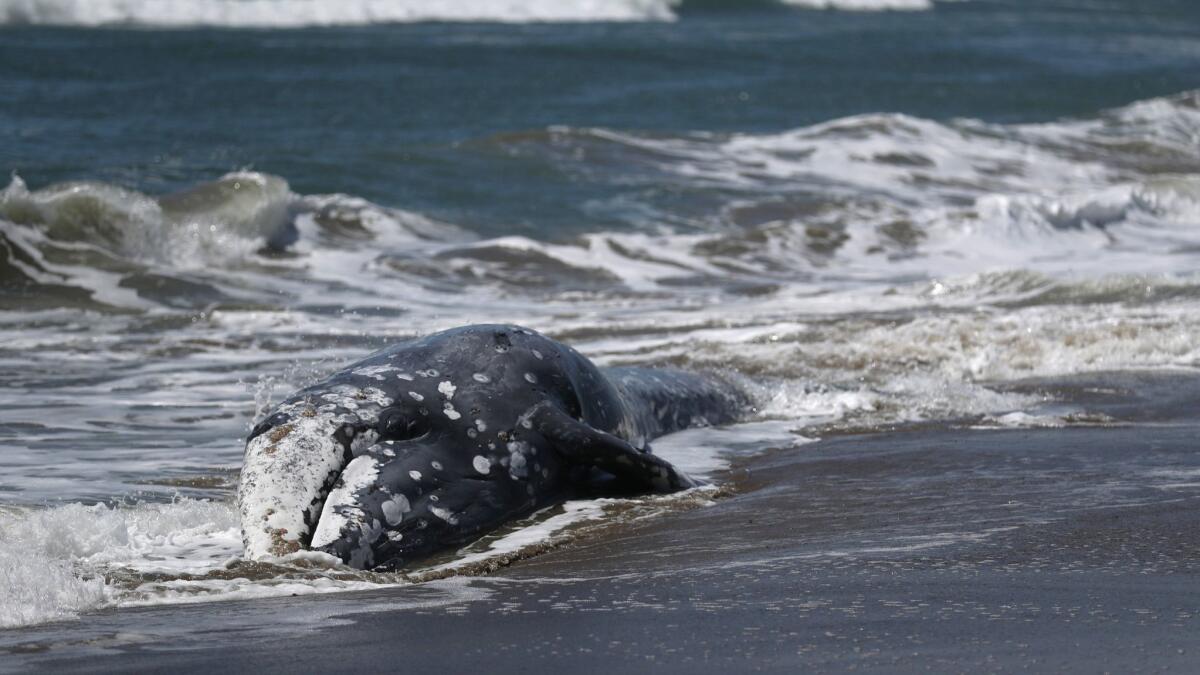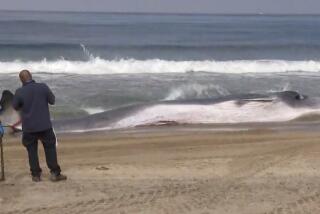13th dead gray whale washes up in Northern California

The carcass of another gray whale has washed ashore in Northern California, marking the 13th dead whale found in the Bay Area this year.
The whale was found Thursday afternoon at Point Reyes National Seashore near Limantour Beach.
The death is the latest in a series of grays — the most frequently seen whale in California — found dead or dying. More than 30 gray whale carcasses have been spotted along the West Coast since January, the most for this time of year since 2000, when 86 whales died. Dozens more have shown signs of malnutrition, and sightings of mother-calf pairs have steeply declined.
The Marine Mammal Center in Sausalito, which studies and rescues sea creatures, has deployed a team to see whether the carcass is still on the beach or if the tide has pulled it back out to sea. If the carcass is found, the center will perform a necropsy to determine the cause of death and collect research samples to better understand what is affecting the whale population.
Scientists aren’t certain what’s causing the uptick in deaths and can’t confirm whether it’s part of a permanent trend, but several deaths have been attributed to malnutrition.
Dr. Shawn Johnson, the director of veterinary science at the center, said that from the photos of the whale, it looked like a recently weaned calf that was malnourished.
Of the dozen other whale carcasses that have come ashore in the Bay Area since March 10, Johnson said seven died from starvation and four were struck by ships. One that washed up in a rocky area too dangerous to retrieve did not undergo a necropsy, so its cause of death was undetermined.
“This is an unusually high number of whale mortalities that we’re seeing here in our region, but also up and down the whole West Coast — all the way to Alaska. This is a bit alarming,” Johnson said. “Typically, we only see 10 whale deaths [in the Bay Area] in a whole year.”
RELATED: Gray whales are starving to death in the Pacific, and scientists want to know why »
The center suspects that some grays are having trouble finding food because of rapid ice melt and warming ocean temperatures, leaving the massive animals in poor condition during their annual migration from breeding grounds in Mexico to feeding areas in Alaska.
“The biologists studying this population are finding that when the whales arrive in Mexico, they’re underweight already, and then they go for months without foraging. So a lot of these whales are trying to head back to Alaska and they’re not making it — they don’t have the energy to make it,” Johnson said.
The center has also seen malnutrition among other species, including the Guadalupe fur seal and California sea lion, which it said is likely due to a disruption in the food web.
RELATED: Sick marine mammals turning up on California beaches in droves »
The center, which responds to animals within 600 miles of the central coastline, said another gray whale death in the Bay Area this month was caused by a ship; a necropsy determined that the injuries from blunt force trauma were consistent with a collision. The whale had an insulating layer of blubber that was thinner than usual.
The marine center recommends that anyone who finds a carcass maintain a safe distance of at least 50 feet and report the death to authorities.
More to Read
Sign up for Essential California
The most important California stories and recommendations in your inbox every morning.
You may occasionally receive promotional content from the Los Angeles Times.











